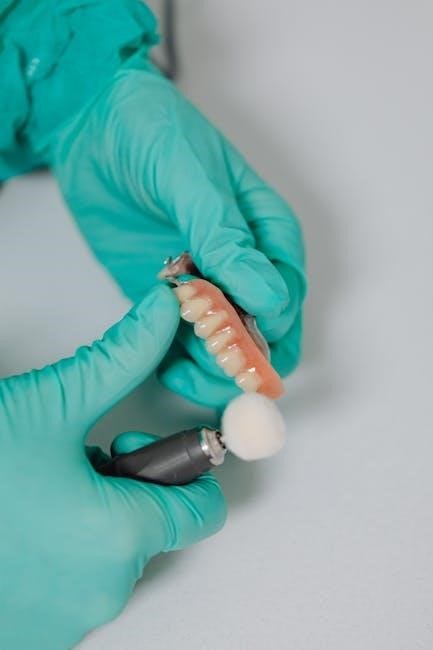Immediate denture post-op instructions are crucial for a smooth recovery and adaptation to new dentures‚ providing a comprehensive guide to ensure proper healing and comfort. This guide helps patients understand the necessary steps to maintain oral health and functionality after the procedure.
1.1 What Are Immediate Dentures?
Immediate dentures are temporary or permanent prosthetics placed right after tooth extraction to restore function and aesthetics. They are custom-made to fit the patient’s mouth and provide a natural appearance. Unlike conventional dentures‚ immediate dentures are inserted immediately after tooth removal‚ eliminating the need for a healing period without teeth. They help maintain facial contour‚ support lips and cheeks‚ and allow patients to chew‚ speak‚ and smile confidently during the healing process. These dentures are often adjusted as the gums heal and may be replaced with permanent ones once the tissue stabilizes.
1.2 Importance of Post-Operative Care
Proper post-operative care is essential for ensuring the success and longevity of immediate dentures. It promotes healing‚ prevents infection‚ and minimizes discomfort. By following guidelines‚ patients can maintain oral health‚ prevent complications‚ and adapt to their new dentures more efficiently. Neglecting care can lead to prolonged recovery‚ poor fit‚ or additional dental work. Adhering to instructions ensures the dentures function optimally and supports overall well-being. Prioritizing post-operative care helps patients achieve a smooth transition to their new smile and maintains their oral health for years to come.

Immediate Denture Procedure Overview
Immediate denture procedures involve tooth extraction followed by the immediate placement of temporary dentures‚ allowing patients to maintain appearance and function during the healing process.
2.1 What Happens During the Procedure
The immediate denture procedure begins with a thorough consultation and impressions of the mouth to create custom-fit dentures. On the day of the procedure‚ the dentist extracts the necessary teeth under local or general anesthesia. Immediately after extraction‚ the pre-fabricated dentures are placed to protect the gums and provide aesthetic appeal. The dentist ensures proper fit and makes minor adjustments. Patients are monitored briefly before being discharged. Detailed post-operative instructions are provided to guide recovery and adaptation to the new dentures.
2.2 Preparing for Recovery
Preparing for recovery involves planning and arranging necessary items beforehand. Patients should stock up on soft foods‚ comfortable clothing‚ and medications as prescribed. Arrange for a caregiver to assist during the initial recovery phase. Ensure a quiet‚ restful environment at home. Fill any prescriptions before the procedure to avoid delays. Avoid eating or drinking as instructed‚ and follow pre-operative guidelines carefully. Have ice packs ready to reduce swelling and a clean‚ soft cloth for any bleeding. Proper preparation ensures a smoother transition and reduces stress during the healing process.

Immediate Post-Operative Care
Immediate post-operative care focuses on protecting the surgical site‚ managing discomfort‚ and ensuring proper denture fit. It involves monitoring for bleeding‚ swelling‚ and initial healing progress to promote comfort.
3.1 First 24 Hours: Do’s and Don’ts
After receiving immediate dentures‚ keep them in place for the first 24 hours to protect the surgical site and promote clot formation. Avoid rinsing vigorously‚ smoking‚ or drinking through a straw‚ as this can dislodge the clot. Use ice packs to reduce swelling and take prescribed pain medication as directed. Stick to a soft food diet and avoid hot beverages. Monitor for excessive bleeding or unusual discomfort. Rest and avoid strenuous activities. Gently clean the mouth with a soft cloth‚ but do not remove the dentures unless instructed by your dentist. Follow these guidelines to ensure proper healing and comfort during the initial recovery phase.
3.2 Managing Swelling and Discomfort
Swelling and discomfort are common after immediate denture placement. Apply ice packs to the face for 15-20 minutes at a time to reduce swelling. Elevate your head while resting to minimize facial puffiness. Take prescribed pain medication as directed to alleviate discomfort. Avoid pressing on the dentures or the surgical sites. Stick to a soft food diet initially to reduce irritation. Monitor for excessive swelling or pain that worsens over time‚ as this may indicate complications. Contact your dentist if symptoms persist or worsen‚ ensuring timely intervention for a smooth recovery.
3.3 Bleeding and Hemorrhage Control
Minor bleeding after immediate denture placement is normal. To manage it‚ bite gently on gauze pads for 30-45 minutes. Avoid spitting or rinsing vigorously‚ as this can dislodge clots. If bleeding persists‚ apply a clean‚ moist gauze or tea bag to the area for 30 minutes. Elevated head position can also help reduce bleeding. Monitor for heavy or uncontrollable bleeding‚ which may indicate complications; Contact your dentist immediately if bleeding does not subside or worsens. Avoid smoking or strenuous activities that could disrupt healing or increase bleeding risk.

Recovery Timeline and Expectations
Recovery after immediate dentures involves a gradual adjustment period‚ with the timeline varying based on individual healing and adaptation to the new dentures‚ ensuring a smooth transition.
4.1 Healing Process Overview
The healing process after immediate dentures is gradual‚ typically spanning several weeks to months. Initially‚ the gums may be swollen and tender‚ but this subsides as tissues adapt. Proper oral hygiene and a soft diet support faster recovery. The dentures protect the extraction sites during healing‚ allowing the bone and gums to remodel. Patients may experience mild discomfort‚ but this diminishes over time. Regular follow-ups with the dentist ensure the dentures fit correctly and the healing progresses smoothly. Patience and adherence to post-op instructions are key for optimal results and long-term comfort with the new dentures.
4.2 Short-Term Recovery (First Week)
The first week after receiving immediate dentures is critical for recovery. Patients may experience initial discomfort‚ swelling‚ and soreness‚ which can be managed with prescribed medications. Ice packs can help reduce swelling during the first 24-48 hours. It’s essential to avoid smoking‚ strenuous activities‚ and hot foods or drinks. A soft‚ nutrient-rich diet is recommended to minimize irritation. Gentle rinsing with saltwater can aid healing‚ but avoid vigorous swishing. Patients should also avoid removing dentures too frequently to allow gums to heal properly. Regular monitoring for signs of complications‚ such as excessive bleeding or severe pain‚ is crucial during this period.
4.3 Long-Term Recovery (Beyond the First Week)
Beyond the first week‚ patients gradually adapt to their immediate dentures‚ with discomfort and swelling subsiding. The gums begin to heal‚ and the dentures feel more natural. Regular follow-up appointments are essential to monitor healing and make necessary adjustments. Patients should continue practicing good oral hygiene and gradually transition to a normal diet. Chewing and speaking may improve with time‚ but patience is key during this adaptation phase. Proper denture care‚ including cleaning and soaking‚ ensures longevity and comfort. Long-term recovery focuses on achieving optimal functionality and confidence with the dentures.
Pain Management and Discomfort Relief
Effective pain management is crucial for comfort during recovery. It can be achieved through prescribed medications‚ over-the-counter pain relievers‚ and proper home care techniques. Balancing comfort and healing is key.
5.1 Recommended Medications
Prescribed or over-the-counter pain relievers‚ such as ibuprofen or acetaminophen‚ are often recommended to manage discomfort after immediate denture placement. These medications help reduce swelling and alleviate soreness. Always follow the dosage instructions provided by your dentist. Pain relievers should be taken as directed to ensure effectiveness and safety. In some cases‚ stronger medications may be prescribed for severe discomfort. Antibiotics might also be recommended to prevent infection. It’s essential to complete the full course of any prescribed antibiotics to ensure proper healing. If pain persists despite medication‚ consult your dentist for further evaluation. Avoid exceeding the recommended dosage to prevent complications.
5.2 Natural Remedies for Pain Relief
Cold compresses can help reduce swelling and ease discomfort. Gently applying an ice pack to the outside of the cheek near the affected area for 15-20 minutes can provide relief. Saltwater rinses‚ made by dissolving a teaspoon of salt in warm water‚ can soothe the gums and promote healing. Aloe vera gel‚ known for its anti-inflammatory properties‚ may also be applied to the gums to alleviate soreness. While these remedies can complement medical treatments‚ always consult your dentist before using any new methods. Natural remedies should not replace prescribed medications but can offer additional comfort during recovery.
5.3 When to Seek Professional Help
If you experience severe pain that doesn’t subside with medication‚ excessive bleeding‚ or swelling that worsens‚ contact your dentist immediately. Seek help if your dentures fit poorly‚ cause persistent sores‚ or make speaking or chewing difficult. Signs of infection‚ such as fever‚ redness‚ or pus‚ require urgent attention. Additionally‚ if you notice loose teeth or unusual movement of the dentures‚ consult your dentist promptly. Timely intervention can prevent complications and ensure proper healing. Don’t hesitate to reach out if you’re unsure about your recovery progress.
Diet and Nutrition After Immediate Dentures
A soft food diet is essential after immediate dentures to promote healing and comfort. Focus on nutrient-rich foods‚ avoid hard or sticky items‚ and stay hydrated for optimal recovery.
6.1 Importance of a Soft Food Diet
A soft food diet is crucial during the initial healing phase after receiving immediate dentures. It minimizes discomfort‚ reduces the risk of irritation‚ and prevents dislodging the dentures. Soft foods like yogurt‚ scrambled eggs‚ and mashed vegetables are gentle on the mouth‚ allowing the gums and tissues to heal properly. This dietary approach also helps patients adapt to chewing and swallowing with dentures‚ ensuring a smoother transition to normal eating habits and supporting overall recovery.
6.2 Recommended Foods for Recovery
During recovery‚ focus on soft‚ nutrient-rich foods that are easy to chew and swallow. Recommended options include yogurt‚ scrambled eggs‚ mashed potatoes‚ soups‚ and soft-cooked vegetables like carrots or spinach. Applesauce‚ bananas‚ and avocados are also excellent choices due to their soft texture and high nutritional value. Lean proteins such as ground meat‚ chicken‚ or fish (without bones) can be incorporated to support healing. Avoid crunchy‚ sticky‚ or hard foods that may cause discomfort or damage to the dentures. Staying hydrated with water or herbal teas is also essential for overall recovery and comfort.
6.3 Foods to Avoid During Healing
During the healing process‚ it’s essential to avoid foods that can irritate the gums‚ dislodge the dentures‚ or cause discomfort. Hard‚ crunchy‚ or sticky foods like nuts‚ raw vegetables‚ chips‚ and caramels should be avoided. Avoid spicy‚ acidic‚ or sharp foods that may cause irritation. Additionally‚ refrain from consuming hot beverages or foods that could burn the mouth. Avoid chewing gum or eating tough meats‚ as they can dislodge the dentures. Stay away from foods with seeds or pits‚ as they can get trapped under the dentures and cause discomfort. Opting for soft‚ gentle foods will support a smoother recovery.

Oral Hygiene and Denture Care
Proper oral hygiene and denture care are vital for maintaining comfort‚ preventing complications‚ and ensuring the longevity of your immediate dentures. Regular cleaning and maintenance are essential.
7.1 Cleaning the Dentures
Cleaning your immediate dentures is essential for maintaining hygiene and preventing bacterial buildup. Use a soft-bristled toothbrush and mild soap to gently scrub all surfaces. Avoid harsh chemicals or abrasive materials‚ as they can damage the dentures. Rinse thoroughly with warm water after meals and before reinserting. Soak the dentures overnight in a cleaning solution to remove plaque and stains. Handle them carefully to avoid bending or breaking. Regular cleaning ensures a fresh‚ comfortable fit and promotes overall oral health. Always follow your dentist’s recommendations for specific cleaning products and techniques.
7.2 Rinsing and Soaking the Dentures
Rinsing and soaking are vital for maintaining denture hygiene. After meals‚ rinse with warm water to remove loose food particles. Soak the dentures overnight in a denture cleaner or a mixture of equal parts water and white vinegar. This helps loosen plaque and stains. Avoid using hot water‚ as it may warp the dentures. Always rinse thoroughly before reinserting. Soaking ensures a deep clean and prevents bacterial growth. Follow the manufacturer’s instructions for soaking solutions to avoid damage. Regular rinsing and soaking keep the dentures fresh and comfortable‚ promoting a healthy oral environment.
7.4 Maintaining Oral Hygiene
Maintaining oral hygiene is essential for overall health and denture longevity. Even with dentures‚ clean your mouth thoroughly after meals. Gently brush your tongue‚ gums‚ and the roof of your mouth with a soft toothbrush to remove plaque and bacteria. Avoid using harsh products or abrasive toothpaste‚ as they can irritate sensitive tissues. Instead‚ rinse with warm saltwater or a mild antibacterial mouthwash. Regularly cleaning the mouth helps prevent infections and bad breath. This routine also promotes healing and ensures a comfortable fit for your dentures. Consistency is key to maintaining a healthy oral environment.

Monitoring Healing and Complications
Monitoring healing and complications is vital to ensure proper recovery. Regularly check for signs of healing progress and identify any unusual symptoms that may indicate issues.
8.1 Signs of Proper Healing
Proper healing after immediate denture placement is indicated by reduced swelling‚ decreased pain‚ and improved comfort. The dentures should fit securely‚ and eating or speaking should become easier. Gums may appear pink and firm‚ signaling healthy blood flow. Patients may notice gradual adaptation to the dentures‚ with minimal soreness. It’s normal to experience some discomfort initially‚ but consistent improvement should occur. If healing progresses smoothly‚ the dentures will function effectively‚ and the mouth will return to a state of normalcy. Monitoring these signs helps ensure a successful recovery and proper integration of the dentures.
8.2 Identifying Potential Complications
Potential complications after immediate denture placement include prolonged pain‚ excessive swelling‚ or bleeding that doesn’t subside. If dentures feel loose or cause persistent sores‚ it may indicate a poor fit. Bad breath or taste could signal infection. Clicking or shifting dentures during speech or chewing may develop‚ affecting functionality. Numbness or tingling in the mouth could occur if nerves are irritated. Monitoring these signs is crucial for early intervention and preventing long-term issues. Addressing these complications promptly ensures proper healing and optimal outcomes for patients adapting to their new dentures.
8.3 Emergency Situations to Watch For
Immediate action is required if severe bleeding persists despite pressure‚ difficulty breathing occurs‚ or intense pain is unmanageable. Excessive swelling that obstructs breathing or swallowing is dangerous. Fever‚ pus‚ or foul odors may indicate infection. If dentures cause significant trauma or fall out‚ seek urgent care. Contact your dentist or visit an emergency room if these situations arise. Prompt intervention is crucial to prevent serious complications and ensure proper recovery.

Follow-Up Appointments and Adjustments
Follow-up appointments are essential to monitor healing and ensure proper fit of the dentures. Adjustments may be needed to achieve optimal comfort and functionality.
9.1 Importance of Follow-Up Visits
Follow-up visits are vital to ensure the dentures fit properly and function as intended. They allow your dentist to monitor healing‚ make necessary adjustments‚ and address any concerns. Regular check-ups help prevent complications‚ such as improper fit or discomfort‚ ensuring optimal comfort and performance. These visits also provide an opportunity to reassess the dentures’ alignment and stability‚ making adjustments to improve chewing and speaking abilities. Consistent follow-ups are key to a successful adaptation to immediate dentures‚ promoting long-term oral health and patient satisfaction. Attending these appointments ensures any issues are resolved promptly‚ enhancing the overall recovery and adaptation process.
9.2 Adjustments to the Dentures
Adjustments to immediate dentures are often necessary to ensure proper fit and functionality. As the mouth heals‚ the dentures may require modifications to accommodate changes in gum shape or alignment. Your dentist will assess the fit‚ making adjustments to improve comfort and performance. This may involve trimming excess material‚ refining the bite‚ or realigning the dentures for better stability. Regular adjustments help address issues like sore spots or uneven wear‚ ensuring the dentures function optimally. These tweaks are crucial for achieving a natural feel and preventing long-term discomfort‚ allowing patients to adapt smoothly to their new dentures.
9.3 Timeline for Follow-Up Care
The follow-up care for immediate dentures typically begins within a week of placement‚ with subsequent visits scheduled at 2-4 weeks‚ 2-3 months‚ and then annually. These appointments allow your dentist to monitor healing‚ assess denture fit‚ and address any issues promptly. The initial visits focus on ensuring proper adaptation and comfort‚ while later check-ups aim to maintain long-term functionality and aesthetics. Regular follow-ups are essential to prevent complications and ensure the dentures remain functional and comfortable over time. Adhering to this timeline helps guarantee optimal results and patient satisfaction.

Lifestyle Adjustments with Immediate Dentures
Adapting to immediate dentures requires patience and practice‚ focusing on speaking‚ eating‚ and social interactions. This section provides practical advice to help patients navigate these changes seamlessly and confidently‚ ensuring a smooth transition to their new lifestyle with dentures.
10.1 Speaking and Chewing with Dentures
Adapting to speaking and chewing with immediate dentures requires practice and patience; Start with soft foods and gradual introduction of solids‚ ensuring even distribution for stability. Practice pronunciation by speaking slowly and clearly‚ as dentures may feel foreign at first. Avoid hard or sticky foods that could dislodge the dentures. Chewing slowly and using both sides of the mouth helps distribute pressure evenly. Over time‚ confidence and comfort in speaking and eating will improve‚ allowing for a more natural and functional lifestyle with dentures.
- Begin with soft‚ easy-to-chew foods.
- Practice speaking in front of a mirror to adjust pronunciation.
- Avoid biting or chewing with the front teeth.
10.2 Social and Professional Life Adjustments
Adjusting to immediate dentures in social and professional settings may require patience and confidence. Initially‚ speaking and eating in public may feel challenging‚ but with practice‚ these activities become more natural. Communicate openly with others about your situation if needed‚ and take breaks when necessary. Professionally‚ focus on clear communication and gradual adaptation to avoid discomfort. Over time‚ dentures will feel more like a natural part of your life‚ allowing you to engage fully in both social and professional environments without hesitation or embarrassment.
- Practice speaking and chewing in private before social interactions.
- Start with small social gatherings to build confidence.
- Stay patient and persistent as you adapt to your new dentures.
- Seek support from loved ones or professionals if feelings of anxiety arise.
- Practice positive affirmations to build confidence.
- Gradually re-engage in social activities to ease back into normal life.
10.3 Emotional and Psychological Support
Emotional and psychological support is vital during the adjustment to immediate dentures. Patients may feel anxious‚ self-conscious‚ or embarrassed about their new appearance or speech. Open communication with family and friends can help alleviate these feelings. Joining support groups or seeking counseling can also provide reassurance and practical advice. Focus on the positive aspects of dentures‚ such as improved confidence and functionality. Celebrate small milestones‚ like mastering certain words or enjoying a favorite meal‚ to boost morale. Remember‚ this transition is temporary‚ and patience with oneself is key to a successful adaptation.
Successful recovery and adaptation to immediate dentures require patience and adherence to post-op instructions. By following these guidelines‚ patients can ensure a smooth transition and improved quality of life.
11.1 Summary of Key Points
Proper post-operative care is essential for successful healing and adaptation to immediate dentures. Patients should follow guidelines on pain management‚ diet‚ oral hygiene‚ and attend follow-up appointments. Monitoring for complications and maintaining open communication with dental professionals ensures optimal results. Patience and adherence to instructions are crucial during the recovery process to achieve long-term comfort and functionality with immediate dentures.
11.2 Final Tips for a Smooth Recovery
For a seamless recovery‚ prioritize patience and adherence to your dentist’s instructions. Allow your mouth time to heal‚ and maintain open communication with your dental team. Focus on a soft-food diet‚ proper oral hygiene‚ and gentle denture care. Stay positive and proactive in managing discomfort or concerns. Regular follow-ups ensure adjustments and a perfect fit. By following these tips‚ you can achieve comfort‚ confidence‚ and optimal functionality with your immediate dentures.
